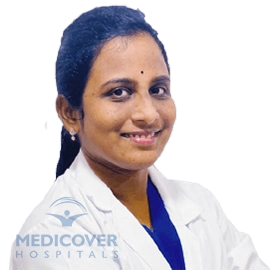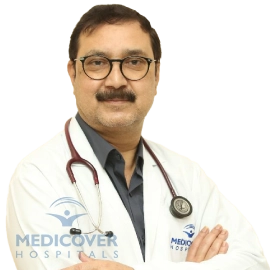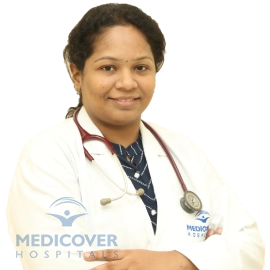Best Pulmonology Hospital in India
Medicover Hospitals is recognised as the best pulmonology hospital in India. We provide expert care for all lung and respiratory conditions such as asthma, COPD, pneumonia, tuberculosis, sleep apnea and interstitial lung diseases. With a team of highly experienced pulmonologists, cutting-edge diagnostic facilities and treatment options, we ensure accurate diagnosis, effective therapy and long-term respiratory health for our patients.
1.2k+
Successful Surgeries
97%
Patient Satisfaction
24/7
Emergency Care
Book Your Consultation
Advanced Pulmonology Procedures & Treatments
As a top pulmonology hospital in India, Medicover Hospitals offers advanced diagnostic, therapeutic and surgical procedures to manage complex respiratory conditions including:
Pulmonary Function Tests (PFTs)
A non-invasive test to check how well your lungs work by measuring airflow, lung capacity and oxygen exchange. Helps detect asthma, COPD and other respiratory issues.
- Accurate Lung Assessment
- Early Detection of Lung Conditions
- Safe & Non-Invasive Procedure
Sleep Studies (Polysomnography)
Comprehensive overnight monitoring of breathing, oxygen levels, heart rate and brain activity to diagnose sleep apnea and other sleep-related breathing disorders.
- Accurate Sleep Disorder Diagnosis
- Monitors Breathing & Oxygen Levels
- Safe & Comfortable Overnight Test
Types of Lung & Respiratory Conditions We Treat
Our pulmonology experts specialise in treating various lung and respiratory disorders, from common breathing issues to complex chronic conditions. We ensure better lung health, improved breathing and enhanced quality of life for our patients by using advanced diagnostics and personalised treatments.
Asthma & Allergic Lung Disorders
Asthma causes inflamed, narrow airways leading to wheezing, coughing and shortness of breath. Allergens, exercise or pollution may trigger symptoms.
Chronic Obstructive Pulmonary Disease (COPD)
COPD is a progressive lung disease including chronic bronchitis and emphysema, causing breathing difficulty and persistent cough, often from smoking.
Pneumonia
Pneumonia is a lung infection causing inflammation of air sacs, fever, mucus-filled cough and chest pain, caused by bacteria, viruses or fungi.
Tuberculosis (TB)
TB is a serious bacterial lung infection causing persistent cough with blood, fever and night sweats, spread through airborne droplets.
Pulmonary Fibrosis
This condition causes scarring of lung tissue, leading to gradual shortness of breath, often from long-term exposure to toxins or certain diseases.
Pulmonary Hypertension
High blood pressure in lung arteries can cause shortness of breath, dizziness, fatigue and may put strain on the heart.
Lung Cancer & Tumors
Lung cancer is the uncontrolled growth of abnormal cells, causing cough, chest pain, weight loss and is often linked to smoking or environmental factors.
Sleep-Related Breathing Disorders
These include sleep apnea, which blocks airways during sleep, causing snoring, breathing pauses, low oxygen levels and daytime fatigue.
Top Pulmonologists in India
At Medicover, we have some of the top lung doctors in India, who are dedicated to diagnosing and treating lung and respiratory disorders with expertise and compassion. Our specialists provide advanced care using modern diagnostic tools and personalised treatment plans.

Advanced Diagnostics for Lung and Respiratory Health
At Medicover Hospitals, we offer advanced diagnostic tests to detect lung and respiratory problems early. Accurate results help our doctors provide safe, effective and personalised treatment for every patient.
Chest X-rays and High-Resolution CT (HRCT) Scans:
Detailed imaging to check lungs for infections, tumors, fibrosis and other problems for accurate diagnosis and treatment planning.
Pulmonary Function Tests (PFTs):
Measures lung capacity, airflow, and breathing patterns to help diagnose conditions like asthma, COPD and other respiratory issues.
Blood Tests for Lung Infections:
Used to detect bacterial, viral or fungal infections affecting the lungs and guide proper treatment.
Bronchoscopy:
A minimally invasive procedure using a thin tube to view airways, remove blockages or collect samples for testing.
Sleep Studies (Polysomnography):
Overnight tests that monitor breathing, oxygen and heart rate to diagnose sleep apnea and other sleep-related breathing disorders.
Allergy and Immunology Testing :
Tests to identify allergic triggers that may cause asthma, breathing problems or other respiratory issues.
Benefits of Advanced Technology for Pulmonology Treatments
-
Early and accurate detection of lung and respiratory disorders with advanced imaging and diagnostic tools.
-
Personalized treatment plans for effective management of asthma, COPD and other respiratory conditions.
-
Minimally invasive pulmonology procedures ensure quicker recovery and improved comfort.
-
Higher success rates in complex lung treatments and interventions with modern technology.
-
Reduced risks, fewer complications and enhanced long-term respiratory health.
Technology Success Rate
Diagnostic accuracy with our advanced imaging and AI technology
Our Promise to You
Safety First
We follow strict infection control measures and advanced pulmonary care protocols to ensure safe treatment for patients with lung and respiratory conditions.
Compassionate Care
Our pulmonologists, respiratory therapists and nursing staff provide personalised attention, emotional support and guidance throughout your treatment journey.
Timely Diagnosis & Treatment
With rapid diagnostics, emergency respiratory support and advanced interventions, we ensure timely care to prevent complications and improve recovery.
Your Health is Our Priority
Medicover Hospitals, the best pulmonology hospital in India, provides expert care for all lung and respiratory conditions. Our top pulmonologists offer accurate diagnosis, advanced treatments and personalised care to help you breathe easier and stay healthy.
Available 24/7 for Emergency Cases

Why Choose Medicover for the Best Pulmonology in India
Medicover Hospital is one of the top pulmonology hospital in India and the best lung hospital in Hyderabad, trusted by thousands of patients across India for lung and respiratory care. Here’s why patients choose Medicover Hospitals:
Recognized Expertise
Our top pulmonologists in India and respiratory medicine doctors are leaders in treating complex lung conditions.
Advanced Diagnostic Tools & Procedures
We use the latest technology for accurate and fast diagnosis.
Comprehensive Care
From diagnosis to treatment and rehabilitation, all pulmonology services are available under one roof.
Patient-Centered Approach
Personalized treatment plans focused on patient comfort, safety and recovery.
Multiple Locations
Convenient access to expert care across Telangana, Andhra Pradesh, Maharashtra, and Karnataka.
Patient Success Stories
Real experiences from patients who regained their mobility and quality of life
I had been struggling with chronic asthma for years, and frequent attacks made daily life very stressful. The doctors here took the time to understand my history, performed thorough tests, and created a personalized treatment plan. They also advised on breathing exercises and lifestyle changes. Now I can manage my asthma much better and live an active life.
Ramesh Gupta
Hyderabad
Chronic bronchitis had been affecting my sleep and work for years. The hospital staff and doctors were extremely attentive, guiding me through treatment and preventive measures. They also taught me lifestyle changes to avoid future flare-ups. Today, I feel much more energetic and confident about my health.
Priya Nair
Vizag
I had recurring respiratory infections that affected my health. The doctors did thorough tests, provided a clear treatment plan, and guided me on lifestyle changes. Now I feel much better. Highly recommend this hospital for pulmonology-related issues.
Sonia
Kurnool
My cousin suffered from COPD and simple activities like climbing stairs were very difficult. The doctors provided a detailed treatment plan, breathing exercises and medication that worked effectively. Now he feel much healthier.
Rohan
Pune
Still have questions? Speak with our experts now!
040-68334455Frequently Asked Questions
Medicover Hospitals is known as the best pulmonology hospital in India for its expert pulmonologists, advanced tests, complete treatments and patient-focused care.
At Medicover Hospitals, a respiratory medicine doctor, also known as a pulmonologist, is a specialist who diagnoses and treats lung and respiratory diseases such as asthma, COPD, lung infections and more.
We treat a wide range of lung and respiratory issues, including asthma, COPD, pneumonia, tuberculosis, lung infections and interstitial lung disease.
You can book an appointment online through our website or call our hospital helpline for quick scheduling.
Absolutely. We provide complete assistance for international patients, including travel support, medical visas and personalised treatment plans.

























